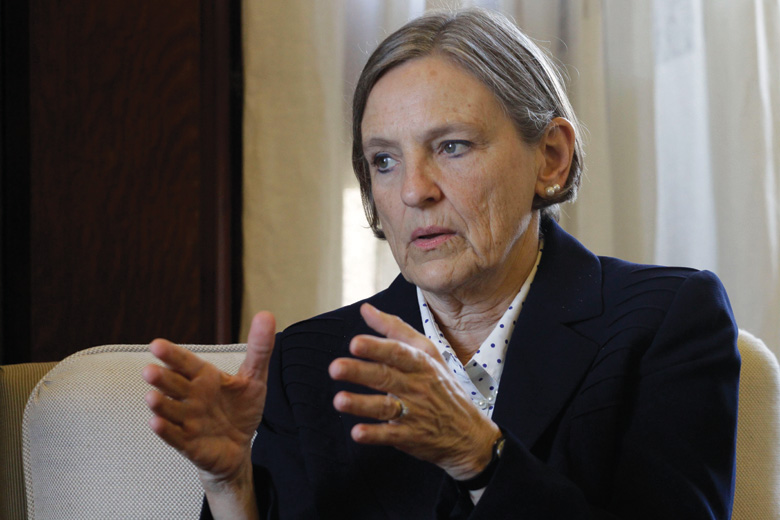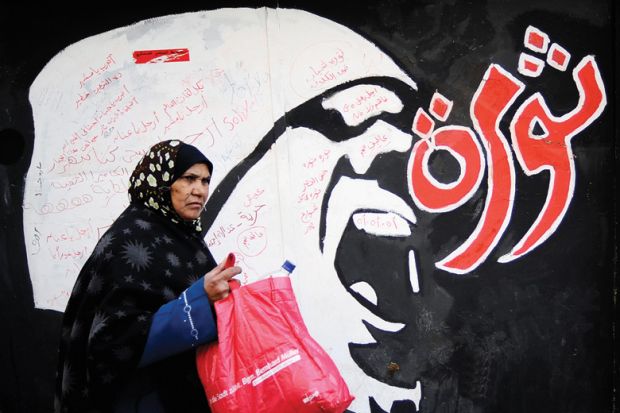In the wake of a fresh round of clashes between anti-government protesters and the Egyptian security services outside the main campus of the American University in Cairo in late 2012, Lisa Anderson went to survey the damage.
The wall of the university fronting on to Mohammed Mahmoud Street – just yards from Tahrir Square, the epicentre of the protests – had long been covered in a graffiti mural commemorating those who had died during the Egyptian incarnation of the Arab Spring, which erupted in early 2011 and led to the downfall of the country’s president, Hosni Mubarak. But Anderson, the AUC’s president, could see that the latest violence had proved particularly destructive: all the road’s paving stones had been ripped up, and a number of windows had been smashed. Despite the uneven surface, though, she was still wearing her trademark heels.
This small detail, captured by a photographer, seems emblematic of Anderson’s tenure at the AUC, which came to a close at the end of last year, just ahead of the fifth anniversary of the uprising. During those extraordinary times – which culminated in the 2013 military coup against Mubarak’s elected successor, Muslim Brotherhood leader Mohamed Morsi – maintaining ordinariness became very important.
Founded in 1919 as a private, English-language liberal arts institution, the AUC is the traditional alma mater of Egypt’s elite; its tuition fees, ranging between $8,240 (£5,694) and $10,300 (£7,118) for domestic students, are well in excess of the country’s average annual income. Anderson, a political scientist, began her term as president in January 2011. When the protests started less than four weeks later, she was afforded a front row seat on her specialist subject: Middle Eastern and North African politics.
But as the country collapsed into chaos, there were more pressing and practical concerns at hand. The university was forced to close when the protests began on 25 January and, with no phone or internet connection, Anderson assembled senior staff at her house and set about drawing up plans for the security of staff, students and buildings, the evacuation of international students who wanted to leave and withdrawals of cash to pay workers. Then she turned to the logistics of ensuring that classes could restart at the AUC’s suburban campus in New Cairo, about 45 minutes away from the Tahrir Square site.
Mubarak was deposed on 11 February and the AUC reopened just two days later; for six weeks, it was the only higher education establishment operating in Egypt. Alongside its usual programmes, students were able to take courses in current affairs, reflecting the fact that this was what was at the forefront of most people’s minds at the time.
For Anderson, the early reopening set the tone for how the AUC would navigate this new era of political uncertainty, allowing academics to return to their work and for the semester to be completed as planned.
“When nothing is ordinary, ordinary is very important,” says Anderson. “People would say they were surprised we opened and I said: ‘That’s what we are here for.’ We owed it to our students, to the families and to the faculties to do what we were supposed to be doing.”
She acknowledges that the nearly three years that she had previously spent as provost and professor of politics at the AUC meant that she was “not easily disconcerted”. She was also able to draw on her experience as dean of the School of International and Public Affairs at Columbia University in New York at the time of the terrorist attacks on the World Trade Center on 11 September 2001, when, again, swift reopening had proved vital in keeping the scholarly community together.
But looking back, Anderson concedes that she had led a “fairly calm and privileged life” before her time as AUC president. She recalls several occasions after taking the top job when she arrived at the Tahrir Square campus to show support for security staff only to encounter tear gas “still hanging in the air”.
After the Arab Spring protests, the Tahrir Square campus was frequently closed for teaching, amid regular outbreaks of anti-government violence that saw both regime forces and protesters attempt to take refuge on the site.
“There was one time when there was a pitched battle in the main building of the campus, when our own security staff lost control of the campus,” recalls Anderson. “They fairly quickly evacuated everybody…and there wasn’t that much damage, but I walked up the stairs to the roof of that building several days later and there was still blood on the walls; it was a mess.
“But then, once [the security staff] got control [again], people also realised we weren’t going to let the campus be one of the sites of the protest; so after that, most Molotov cocktails and so forth that came on to the campus were sort of by mistake rather than an attack on the campus itself.”
Traditionally, the president of the AUC is provided with bodyguards by Egypt’s Ministry of the Interior. Anderson initially questioned the need for this: nothing had happened in the country that had caused her to fear for her personal safety during the previous 30 years. Eventually, an arrangement was reached whereby she would be unaccompanied on campus but protected while moving around the city – a wise move in hindsight.
“There was one time in the entire presidency when I was physically assaulted, and [the bodyguards] were spectacular and got me out of harm’s way,” she says. “I grew to trust their judgement: I would say, ‘I want to go downtown,’ and they would never say ‘no’ but they would wince and I would know it was not a good idea.”
Once the television cameras had moved on after Mubarak’s fall, Anderson faced the challenge of securing the AUC’s future in the new Egypt, first under Morsi and then under the military regime that deposed him, led by Abdel Fattah el-Sisi. Financially, the AUC faced major challenges. It had evacuated about 400 international students, who accounted for more than half its overseas cohort and between 10 and 15 per cent of its total enrolment. International recruitment would fall further in subsequent years, and Anderson admits that she was reluctant at first to concede that this would be a long-term problem. Hence, the replacement of international learners with native students was a slow process. Anderson was forced to raise tuition fees, while budgets for scholarships and salaries came under severe pressure.

Perhaps an even greater challenge for the AUC was to negotiate the new politics of Egypt, and to work out how to allow staff and students to express political opinions while protecting them from the security services. Under Mubarak, discussion of politics and religion on university campuses had been frowned on, says Anderson. But amid growing political engagement, she took the view that this could no longer be justified and that it “wasn’t very American”. This led her to set up a committee to draft a freedom of expression policy for the AUC. This was modelled on the policy at Carnegie Mellon University in Pittsburgh, which permits people to say what they like as long as they do not advocate violence or disrupt classes.
“This was a novelty for an Egyptian campus,” says Anderson. But it “worked very well because we had a pretty free-wheeling debate but it wasn’t disruptive”.
Over time, however, concerns grew that AUC students and staff might insult the Egyptian president – something that remained a criminal offence even after Mubarak’s downfall. Anderson was clear that this could not be allowed, for fear of the risk to the individuals involved and to the institution.
As it happened, it was a different president who became the next target of students’ protests: Anderson herself. The demonstrators objected to an alleged lack of transparency in governance and budget-setting. Anderson stresses that the budget was not entirely under her control, being the responsibility of the university trustees, but she believes that these protests may have helped to protect students by diverting their fire away from the various presidents of the republic.
“No one enjoys being insulted, all the more [so] when it seems a bit unfair,” says Anderson. “But the alternative – to limit speech on campus – would have been a much greater insult to what is important about a university; so I winced and lived with it, reciting the old nursery rhyme – ‘sticks and stones will break my bones but words will never hurt me’ – to myself like an incantation. It probably resonated as much as it did [with me] since there had so recently been a lot of sticks and stones in the air in Egypt. Rude language and unflattering pictures really are a small price for freedom of thought and expression.”
As time went on, Anderson adds, “people became confident and reassured by the fact that the AUC would stand for that, and it permitted us to have debates about national politics, international politics, American policy and university policy in a way which was sometimes raucous but never overstepped the line of keeping the university’s ordinary operations going”.
Perhaps the greatest threat to the AUC’s future was the risk that either the Morsi or Sisi government would take a dislike to the institution at a time when being “American” was not particularly popular in Egypt. Anderson’s bodyguards were concerned that she looked too similar to Anne Patterson, the US ambassador who became a target of protesters’ wrath, and Anderson wryly recalls her relief that Patterson’s successor was a tall man. That the AUC managed to remain on the right side of the politicians can partly be credited, in Anderson’s view, to the fact that both the military and even the Muslim Brotherhood included AUC alumni, or their parents or friends.
“I would remind people that we were very much an Egyptian institution,” Anderson recalls. “The point of the AUC had been, from its very inception, to create the people who would lead the country, and we didn’t have any particular agenda for the country so much as we had the conviction that a better-educated elite is better for the country. We said that often enough that, over the course of time, the extent to which we were ‘American’ sort of receded – and that was deliberate.”
Anderson decided to leave the AUC having accomplished all that she felt that she could, leaving the institution feeling “more self-confident” about its role in Egypt. She also feared that if she went on any longer she would start repeating herself: “After a certain point, rehearsing the same positions, however virtuous and correct they may be, just doesn’t seem that interesting – or, for that matter, that beneficial to an institution,” she says.
In the aftermath of Anderson’s departure, academic freedom in Egypt has been under the microscope following the death of Giulio Regeni, a University of Cambridge PhD student who was apparently abducted and tortured to death earlier this year while researching the country’s trade unions.
Writing in The Chronicle of Higher Education in February, Anderson warned that the risk of violence could become a “debilitating reality” for scholars hoping to work in Egypt. But she warned against “acting on alarm and revulsion”, arguing that “it does no service to anyone to abandon pursuing the kind of research those who have been silenced had wanted to do”.
As for Egypt’s wider future, Anderson tells THE she is “much more sanguine” about it than many observers, who see the country as emblematic of the failure of the Arab Spring to realise the developments in democracy and human rights that the protesters hoped for. In her view, the political awakening in Egypt’s population that the revolution brought about will allow progress to be made over time.
“Clearly the [current] government has an enormous set of problems on its plate and I don’t envy it at all. Its capacity to manage these problems is fairly limited, both by its resources and by the quality of its administrative staff,” she says. “But I do think there’s a sense that the ordinary Egyptian – such as one can say there is one – has actually changed. I think there’s more of a sense of confidence and more of a sense of citizenship. I think people have a sense of ownership of the country that they didn’t have before, and I think that will make a big difference over time. I’m not so optimistic about human nature that I think this couldn’t be reversed, but it would be very hard.”
POSTSCRIPT:
Print headline: ‘When nothing is ordinary, ordinary is very important’
Register to continue
Why register?
- Registration is free and only takes a moment
- Once registered, you can read 3 articles a month
- Sign up for our newsletter
Subscribe
Or subscribe for unlimited access to:
- Unlimited access to news, views, insights & reviews
- Digital editions
- Digital access to THE’s university and college rankings analysis
Already registered or a current subscriber? Login






